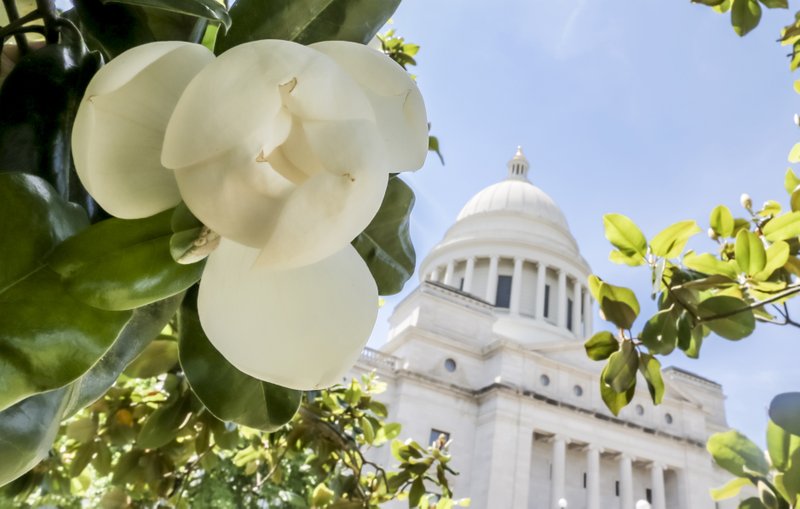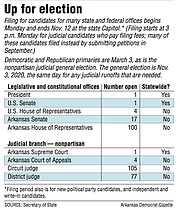The 2020 election cycle — in which Arkansans will have the opportunity to pick candidates for president, U.S. Senate, Congress and a host of state offices — officially kicks off Monday with the opening of the weeklong candidate filing period at the state Capitol.
As it did four years ago, Arkansas is holding its candidate filing several months early so that the primaries can be held March 3, along with 13 other states participating in the “Super Tuesday” presidential primaries. The general election is Nov. 3, 2020.
In non-presidential election years, Arkansas holds its primaries in May, with a filing period in late February. The 2018 general election was just a year ago.
The party filing period begins at noon Monday in the Capitol rotunda, while the filing period for nonpartisan and judicial offices starts at 3 p.m. The filing period ends Nov. 12.
For months, candidates in every corner of the state have announced plans to run in dozens of legislative, judicial and congressional races. Still, the lineup for some high-profile races remains unresolved at the start of the filing period:
Will the two major parties contest more state legislative races than they did in the 2018 midterms elections?
Will Republican Mickey Gates, who was expelled from the House after pleading no contest to tax charges, file for reelection to his former House seat?
How many of the 17 Democratic candidates for U.S. president will participate in Arkansas’ March primary?
Will any Democrat step up to challenge U.S. Rep. French Hill, R-Little Rock, in the state’s most competitive congressional district?
Will Supreme Court Justice Josephine “Jo” Hart choose to retire, or forfeit her benefits to run for another eight-year term?
Republicans control a super-majority in each chamber of the state Legislature, with 75 seats to the Democrats’ 22 seats in the House (three seats are vacant), and 26 seats to nine in the Senate.
The GOP also controls all four U.S. House districts, as well as both U.S. Senate seats. U.S. Sen. Tom Cotton, a Republican from Dardanelle, is up for reelection for a six-year term in 2020.
Those incumbencies have helped the party during the earlier filing period, said Republican Party of Arkansas Chairman Doyle Webb. The Democrats, meanwhile, have had less time since the last filing period to find challengers for a large number of seats.
“Early filing period always makes it harder for candidate recruitment,” said Democratic Party of Arkansas Chairman Michael John Gray. “People feel like they just came out of an election.”
Libertarian, independent and write-in candidates also fill out paperwork with the secretary of state’s office during the filing period, as will candidates in more than 188 races for judicial and nonpartisan offices.
Candidates for county offices file with their county clerks. Depending on the form of government of the city in question, municipal candidates typically file during one of several filing periods during the summer.
LEGISLATIVE RACES
In last year’s midterms, 47 out of 118 state legislative races (exactly 40%) fielded candidates from both the Republican and Democratic parties, the most since 2012. The two parties also contested most of the state constitutional offices and all four congressional races in 2018.
The results on Election Day showed little change in which party was victor.
The Democrats flipped two state House seats in Northwest Arkansas, following a national leftward trend in the suburbs. At the same time, Republicans gained two seats in the former Democratic stronghold of rural eastern Arkansas, including ousting Gray, the Democratic Party leader, from his state House seat in Woodruff County. Republicans retained control of all statewide and congressional offices.
To attract more candidates, the Democratic Party lowered its filing fees in September in races that the party has not contested in recent cycles.
Webb, the Republican chairman, cast the move as “an act of desperation” and said the GOP was happy with its filing fees.
Gray said the change likely came too late to have much of an effect this cycle. Both party leaders said they expected to field candidates in about the same number of legislative races as last year.
Janine Parry, a professor of political science at the University of Arkansas, Fayetteville, said national politics and attitudes toward President Donald Trump were likely having “coat-tail effects” in drawing out local candidates in Arkansas, especially for Democrats who have suffered repeated electoral losses since control of state government flipped to the Republicans in 2012.
“If they can keep [recruitment] up … that’s a sign that there’s some sign of life” in the Democratic Party, Parry said. “They may, because the national volume is turned up so high.”
Webb said non-incumbent Republicans have largely been drawn to primary challenges — he expected about a dozen GOP primaries in the House, and two in the Senate — and to challenging more liberal incumbent Democrats.
Unlike past cycles, when candidates in Republican primaries have largely fought over support for the state’s private-option Medicaid expansion, Webb said primaries in the GOP next year will likely be cast in more general terms between moderate Republicans and party members who are further to the right.
“Many Republicans are settling to the fact that [Medicaid] expansion is here, but it needs to be made more acceptable,” Webb said.
The Medicaid expansion provides health insurance to about 250,000 low-income Arkansans.
Retirements, the death of state Rep. John Walker, D-Little Rock, and the expulsion of Gates, a Republican from Hot Springs, have left nine expected House vacancies and one Senate vacancy heading into the filing period.
Gates, who previously promised to run next year for another term in the days before the House voted to expel him last month, has since left the door open to not running. Meanwhile, two other Republicans have already announced plans to run in a special primary election for his former seat.
In a phone interview Friday, Gates suggested that he would wait until the final day of the filing period before deciding whether to run. If he does run, he said he will do so as a Republican.
The Republican Party of Arkansas has received a legal opinion on whether it can block Gates from filing as a Republican, said spokesman Stephen Houserman. The party declined to reveal the contents of the opinion.
The 35-member Senate has 17 seats up for election, since the rest were settled in 2018. Senators have four-year terms, compared with two-year terms for the 100 state representatives.
NATIONAL RACES
Presidential hopefuls also are expected to officially put their names in the running for Arkansas’ primaries. It’s unlikely that the candidates will appear at the Capitol. Most such campaigns send surrogates to fill out the paperwork with the secretary of state’s office.
Arkansas’ presidential primary will take place March 3 — “Super Tuesday” — along with states with larger delegate totals, such as California, Texas and North Carolina.
That could make participation in Arkansas’ primary a “barometer” for the seriousness of some campaigns, according to Andrew Dowdle, a University of Arkansas political science professor who studies the presidential nomination process.
“If you’re a somewhat serious candidate, you’d be able to spend $2,500 to get on the ballot,” Dowdle said, referring to the presidential filing fee for Democrats.
The $25,000 filing fee for Republican presidential candidates is more likely to be a barrier to filing, Dowdle said.
Webb said last week that he’d been contacted three times by the campaign of former Massachusetts Gov. Bill Weld, who has announced a primary challenge to Trump. Still, Webb said he remained uncertain whether Weld would eventually file.
Other potential GOP challengers to Trump, including former U.S. Rep. Joe Walsh of Illinois and former U.S. Rep. Mark Sanford of South Carolina, have not contacted Arkansas’ Republican Party, Webb said.
All four members of Arkansas’ all-Republican congressional delegation are expected to file for reelection, as is Cotton.
Democrats have announced candidates in the 3rd and 4th Congressional Districts — held by U.S. Reps. Steve Womack of Rogers and Bruce Westerman of Hot Springs, respectively — and for U.S. Senate, where Democrat Josh Mahony of Fayetteville hopes to challenge Cotton.
It is in central Arkansas’ 2nd Congressional District, held by three-term incumbent Hill, that Democrats see their best chance of flipping a seat. Hill won reelection by six points last year against Democrat Clarke Tucker (who is now running for a state Senate seat).
Democrats had yet to announce a candidate heading into the final weekend before filing, but party officials are meeting with potential candidates, according to spokesman Jacob Kauffman.
Democrats have yet to find anyone to run in eastern Arkansas’ 1st Congressional District, Gray said, and are not expecting to contest the seat held by U.S. Rep. Rick Crawford of Jonesboro.
JUDICIAL RACES
Candidates for nonpartisan judgeships file starting Monday unless they already submitted signatures in September.
In those races, March 3 is the general election. If a runoff is needed, it will be held Nov. 3, 2020.
The highest judicial office on the ballot will be Position 4 on the Arkansas Supreme Court, now held by Hart. Hart, when reached by telephone at her home Friday, said she had yet to decide whether she would retire or run for reelection.
“I don’t know if I’m ready to quit or not,” said the justice, adding that she turns 76 next month.
If Hart were to serve past her current term, she would be forced to forfeit her retirement benefits under a state law aimed at pushing older judges to step down.
There are two candidates for Position 4 on the Arkansas Supreme Court. Pulaski County Circuit Judge Morgan “Chip” Welch had announced earlier. On Saturday, Barbara Webb of Benton announced she was seeking the seat. She is married to Doyle Webb, the state Republican chairman.
Four spots on the 12-member Arkansas Court of Appeals are up for election in 2020.
Two Court of Appeals incumbents — Mike Murphy (District 2, Position 2) and Mark Klappenbach (District 5) — were among the 201 judicial and nonpartisan candidates to submit signatures during the early filing period. A third Court of Appeals judge, Brandon Harrison (District 4, Position 1), did not return a phone call Friday on whether he planned to run for reelection.
In the Court of Appeal’s District 4, Position 2, spot, Texarkana prosecutor Stephanie Potter Barrett and Hot Springs District Judge Emily White both submitted petitions early to run for the seat held by Judge Meredith Switzer, who is ineligible to run again after being appointed early this year to fill the vacancy left by the death of Court of Appeals Judge David “Mac” Glover.
In addition, James McMenis has filed early to run against Klappenbach, in a rematch of the 2018 runoff for the judicial seat.
Candidates also are filing for circuit court and district court positions.
Information for this article was contributed by Frank E. Lockwood of the Arkansas Democrat-Gazette.

